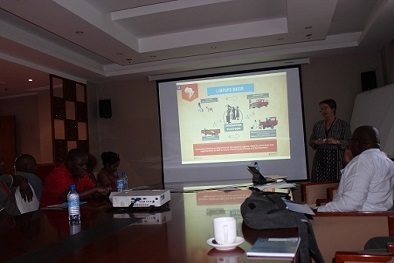The assignment conducted between June – December 2014 involved developing knowledge products for specific end users and decision makers as a means of fostering regional ownership of project outputs and outcomes through national and regional dissemination events. The collaboration was designed to add value to the CGIAR Challenge Programme for Water and Food (CPWF), Limpopo Basin Development Challenge (LBDC) research outputs on the Limpopo River basin.
The knowledge products developed are in the form of technical briefs, booklets and infographics, all designed to cater for general audiences and specific audiences such as policy makers, decision-makers at national and local level, local communities, researchers and adaptation practitioners as well as the broader public in the Limpopo riparian countries.
The procedure of developing the knowledge products involved engagement processes between the LBDC researchers and staff and communication personnel from GWPSA. This process involved extracting key messages of the research results. This effort was complimented by involving graphic arts tasked with ensuring that an adequate supply of illustrations and data from agreed research outputs was supplied to support the messaging of the programme work. This was of great importance to the assignment as there was the need to simplify research content by developing illustrations, animations and infographics to pass on the key messages.
The main outcome of this exercise is that the modified messages have continued being used in various platforms including video, online and printed communication materials to increase uptake of the findings by target audiences. These knowledge products are now used by a consortium of stakeholders for information and sharing. The first distribution of the knowledge products was during the 16th WaterNet/WARSFA/GWPSA Symposium, in Lilongwe, Malawi from 28 -31 October, 2014.
During the symposium, GWPSA conducted a special session on ‘Conversion and Conveyance of Limpopo Basin Development Challenge (LBDC) Research results’ . Using the infographics as presentation aids, the various LBDC researchers explained and shared the various research results. The session achieved the following objectives through the presentations and discussions:
- By presenting the key messages taken from the research evidence, the session demonstrated pathways and the linkages to increasing productivity and improving livelihoods for smallholder farmers in the Basin.
- The session set the context by providing an overview of the research outputs from the five components of the LBDC.
- The session further demonstrated how translating research results into knowledge products, such as infographics could be used in communicating to a broader audience.
The presentations were followed by discussions that centred on ways of best promoting Research for Development (R4D) in the region. The key issues agreed on were the following:
- Involvement of a number of stakeholders in a process of defining the research agenda and delivering research that is relevant to the decisions facing decision makers today. The group discussed opportunities to contribute to this process, and was then informed that WaterNet was taking responsibility for working on this in the coming year.
- In order to justify investment in research, outputs should lead to outcomes and eventual impact—far outliving the project life cycle. Engaging a wide range of stakeholders early (and often) in the process is necessary.
- LBDC research showed that failure to acknowledge and respond to the expressed needs of farmers and rural populations often leads to poor design and implementation—and is a common cause of technological failure. Discovering incentive structures for rural decision making is critical to designing and implementing more successful initiatives.
- LBDC research showed that institutional inadequacies are a major contributing factor to underperforming technologies, schemes, programmes and initiatives. This includes issues of unclear roles and responsibilities, overlapping or gaps in mandates, and unreasonable assumptions about capacity.
The session resolved on the need to further discuss integrated R4D for the region, in order to set a SADC research agenda. Key to the attendees at the session included Mr. Phera Ramoeli (SADC) and Mr. Nico Elema, (AU/NEP AD Water Centres of Excellence), thus ensuring policy input in the discussion on integrating and planning for R4D for the SADC region.
Post December 2014, the knowledge products will continue to be shared at various dissemination channels, including three roll out workshops to be held in 2015. These dissemination channels using the developed knowledge products will contribute to improving governance and management of rain water in a bid to raise productivity, reduce poverty and improve livelihood adaptation in the Limpopo.
